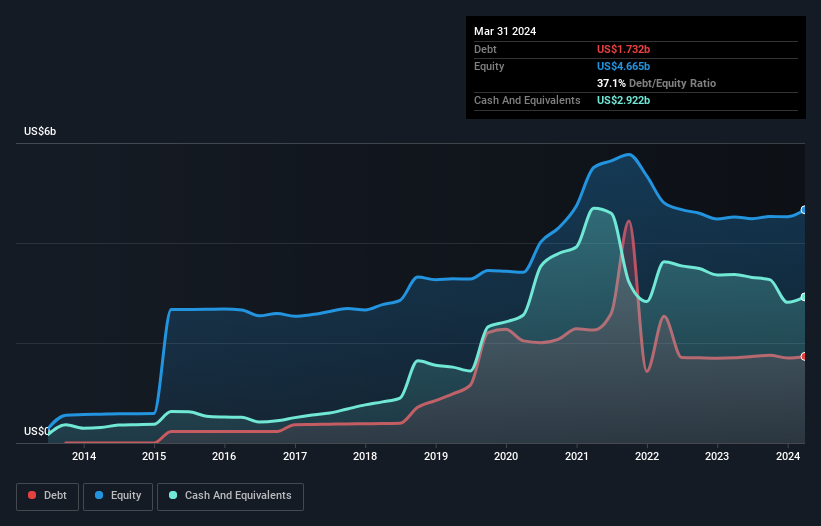
The external fund manager backed by Berkshire Hathaway's Charlie Munger, Li Lu, makes no bones about it when he says 'The biggest investment risk is not the volatility of prices, but whether you will suffer a permanent loss of capital.' It's only natural to consider a company's balance sheet when you examine how risky it is, since debt is often involved when a business collapses. Importantly, Zillow Group, Inc. (NASDAQ:ZG) does carry debt. But is this debt a concern to shareholders?
When Is Debt A Problem?
Debt is a tool to help businesses grow, but if a business is incapable of paying off its lenders, then it exists at their mercy. Ultimately, if the company can't fulfill its legal obligations to repay debt, shareholders could walk away with nothing. However, a more frequent (but still costly) occurrence is where a company must issue shares at bargain-basement prices, permanently diluting shareholders, just to shore up its balance sheet. By replacing dilution, though, debt can be an extremely good tool for businesses that need capital to invest in growth at high rates of return. When we examine debt levels, we first consider both cash and debt levels, together.
Check out our latest analysis for Zillow Group
What Is Zillow Group's Net Debt?
As you can see below, Zillow Group had US$1.73b of debt, at March 2024, which is about the same as the year before. You can click the chart for greater detail. However, it does have US$2.92b in cash offsetting this, leading to net cash of US$1.19b.

A Look At Zillow Group's Liabilities
According to the last reported balance sheet, Zillow Group had liabilities of US$1.00b due within 12 months, and liabilities of US$1.16b due beyond 12 months. Offsetting this, it had US$2.92b in cash and US$100.0m in receivables that were due within 12 months. So it can boast US$864.0m more liquid assets than total liabilities.
This surplus suggests that Zillow Group has a conservative balance sheet, and could probably eliminate its debt without much difficulty. Simply put, the fact that Zillow Group has more cash than debt is arguably a good indication that it can manage its debt safely. There's no doubt that we learn most about debt from the balance sheet. But it is future earnings, more than anything, that will determine Zillow Group's ability to maintain a healthy balance sheet going forward. So if you want to see what the professionals think, you might find this free report on analyst profit forecasts to be interesting.
Over 12 months, Zillow Group reported revenue of US$2.0b, which is a gain of 6.0%, although it did not report any earnings before interest and tax. That rate of growth is a bit slow for our taste, but it takes all types to make a world.
So How Risky Is Zillow Group?
While Zillow Group lost money on an earnings before interest and tax (EBIT) level, it actually generated positive free cash flow US$170m. So taking that on face value, and considering the net cash situation, we don't think that the stock is too risky in the near term. With mediocre revenue growth in the last year, we're don't find the investment opportunity particularly compelling. There's no doubt that we learn most about debt from the balance sheet. But ultimately, every company can contain risks that exist outside of the balance sheet. These risks can be hard to spot. Every company has them, and we've spotted 1 warning sign for Zillow Group you should know about.
If, after all that, you're more interested in a fast growing company with a rock-solid balance sheet, then check out our list of net cash growth stocks without delay.
Valuation is complex, but we're here to simplify it.
Discover if Zillow Group might be undervalued or overvalued with our detailed analysis, featuring fair value estimates, potential risks, dividends, insider trades, and its financial condition.
Access Free AnalysisHave feedback on this article? Concerned about the content? Get in touch with us directly. Alternatively, email editorial-team (at) simplywallst.com.
This article by Simply Wall St is general in nature. We provide commentary based on historical data and analyst forecasts only using an unbiased methodology and our articles are not intended to be financial advice. It does not constitute a recommendation to buy or sell any stock, and does not take account of your objectives, or your financial situation. We aim to bring you long-term focused analysis driven by fundamental data. Note that our analysis may not factor in the latest price-sensitive company announcements or qualitative material. Simply Wall St has no position in any stocks mentioned.
About NasdaqGS:ZG
Zillow Group
Operates real estate brands in mobile applications and Websites in the United States.
Flawless balance sheet with reasonable growth potential.
Similar Companies
Market Insights
Community Narratives



